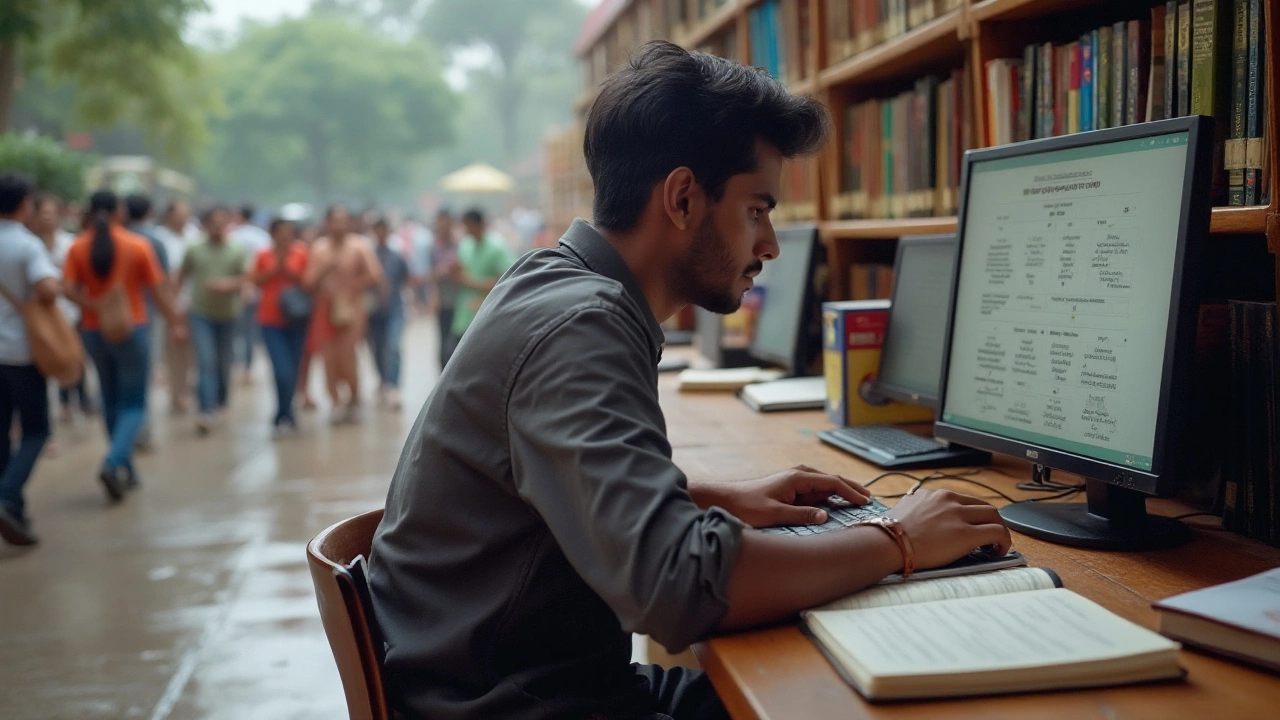
Aspiring to secure a seat in IIT Bombay within the span of just 5 months is no small feat. Many students have wondered if such a challenge is possible or merely a pipe dream. While the road is tough, with the right mindset and preparation strategy, it's not outside the realm of possibility.
The first step is understanding the vast ocean called IIT JEE. Familiarizing yourself with the exam pattern can prevent many pitfalls. Knowing which subjects and topics bear more weight can help you allocate your study time more effectively. Mathematics, physics, and chemistry form the core of your study material.
Crafting a smart study plan is half the battle won. It’s not just about spending hours in front of books but about making those hours count. Frequent practice through mock tests is essential as these mirror the exam's pressure and help in self-assessment.
Keeping your mind calm and motivated is as vital as studying itself. There will be moments of doubt, but with resilience and determination, those hurdles can be overcome. By maintaining focus and a positive attitude, you increase your chances of climbing this academic Everest called IIT Bombay.
- Understanding the IIT JEE Exam Pattern
- Essential Subjects to Focus On
- Crafting a Study Plan for Success
- The Importance of Regular Practice and Mock Tests
- Mental Resilience and Staying Motivated
Understanding the IIT JEE Exam Pattern
When you're aiming to enter one of the prestigious institutes like IIT Bombay, having a solid grasp of the IIT JEE exam pattern is crucial. The Joint Entrance Examination is divided into two main parts: JEE Main and JEE Advanced. Each of these has its own format, challenges, and objectives. Aspirants need to clear the JEE Main to qualify for the JEE Advanced, which is the gateway to IITs.
The JEE Main examination typically consists of two papers. Paper 1 is for admission to B.E./B.Tech courses and is held in a computer-based test mode. It has a balanced distribution of questions from Mathematics, Physics, and Chemistry. Each section demands your comprehensive understanding and application of concepts. Paper 2, aimed at admissions into B.Arch and B.Planning courses, evaluates a different set of skills, including mathematics aptitude, drawing, and planning-based questions.
JEE Advanced, on the other hand, is known for its higher difficulty level and rigorous assessment. Unlike JEE Main, which may require direct applications of formulas, JEE Advanced often tests your analytical ability and deeper understanding of concepts. The paper design varies each year and is known for its unpredictability, keeping students on their toes. Typically, the exam is divided into two papers held on the same day. Both papers cover Mathematics, Physics, and Chemistry but do so in a manner that assesses both speed and accuracy.
A key aspect to note about the JEE exams is their negative marking scheme. This means that aspirants need to exercise caution while attempting questions, as incorrect answers can subtract valuable points from their scores. Understanding this pattern helps in strategizing during the exam on whether to attempt a question or not, based on confidence in the solution.
"The essential thing to know about IIT JEE is that it’s not about solving the hardest problems, it's about solving all types of problems correctly," said an IIT alumnus in an interview with a leading education portal.
The question pattern typically includes multiple-choice questions, numerical value answer questions, and others, which require a blend of different problem-solving theories and techniques. It’s here that regular practice through mock tests becomes indispensable. By taking these tests under timed conditions, students can simulate the actual exam atmosphere, aiding in time management and familiarity with the question types.
Additionally, understanding the distribution of marks among subjects could assist you in focusing on your strengths while addressing weaker areas diligently. For instance, if Chemistry has historically been your stronger suit, securing maximum scores in that section could be an easy win while you focus on tackling tougher sections such as Mathematics.
Essential Subjects to Focus On
When you're preparing to crack IIT Bombay within a tight window of five months, prioritizing the right subjects becomes crucial. The IIT JEE preparation journey revolves around three subjects: mathematics, physics, and chemistry. Each of these subjects comes with its challenges but mastering them is pivotal in securing a spot in one of the most prestigious institutions.
Mathematics is often a test of not just knowledge but also problem-solving speed. Key areas such as calculus, coordinate geometry, and algebra require not only understanding but regular practice. Ever since the introduction of complex numbers and integral calculus into the syllabus, the complexity has leveled up. Regular practice with past years' papers and a timed environment helps simulate actual exam conditions.
Physics demands a deep understanding of principles and the ability to apply them in varied scenarios. Topics like mechanics, electricity and magnetism, and modern physics are favorites in the IIT JEE exams. Concepts should be crystal clear, something echoed famously by Richard Feynman, a celebrated physicist, who said, “If you cannot explain it simply, you don’t understand it well enough.”
Citing Richard Feynman
Chemistry is divided into three parts: organic, inorganic, and physical. Each holds its distinct challenges. Organic chemistry, in particular, is like learning a new language with its endless reactions and mechanisms. Inorganic chemistry is fact-based, and memorization plays a significant role, while physical chemistry requires strong application of mathematical concepts. An efficient way to tackle chemistry is to understand the foundational concepts and dedicate time to learn and revise them thoroughly.
Resourcefulness is an asset in preparing for IIT JEE. Using summary notes, flashcards, or interactive tools can help retain critical information quickly. Consistent assessment through practice tests and solving previous years' questions can significantly enhance your preparation. Pay attention to frequently asked questions to gauge which topics require more focus. Each subject has its pitfalls, and identifying your weak areas early ensures more time to polish and improve them before the exam day.

Crafting a Study Plan for Success
Creating a study plan for your IIT JEE preparation can be the compass that guides you through these challenging months. The pressure of cracking IIT Bombay in just 5 months is immense, but a structured study plan can help manage your time efficiently and keep your goals on track. Begin by evaluating your current level of understanding across the core subjects: mathematics, physics, and chemistry. It’s crucial to identify both your strengths and areas that need improvement. This self-assessment will form the backbone of your preparation strategy and help you focus on what matters most.
Constructing a balanced timetable is equally critical. Allocate regular study slots to each subject, ensuring that you cover all critical topics. The key here is consistency rather than sheer volume. A consistent study schedule helps reinforce your learning and retain information longer. Incorporate breaks strategically to rejuvenate your mind. This prevents burnout and keeps you motivated to study each day. It might help to keep weekends slightly flexible for extra revisions or to tackle subjects you find more challenging. This adaptive flexibility can substantially boost your productivity and retain effectiveness over time.
Utilizing Resources Effectively
When it comes to materials, choosing the right resources makes a difference. Stick to only a few trusted books and resources instead of flooding yourself with every available material. NCERT books are indispensable and should be your main focus but supplement them with specialized books like H.C. Verma for physics, R.D. Sharma for mathematics, and O.P. Tandon for chemistry. The importance of utilizing previous years' papers can’t be overstressed. Solving them regularly offers insights into the pattern and difficulty level of the actual exam. Online platforms and lecture videos can also provide additional help and clarification. However, make sure to set daily targets for completion, which will help in covering the vast syllabus efficiently.
“Success is the sum of small efforts, repeated day-in and day-out.” — Robert Collier
This quote emphasizes the importance of persistent effort. Evaluate your progress routinely to ensure your study plan remains effective. It's vital to allocate time for revisions and mock tests, especially as the exam nears. Regularly scheduled mock tests are akin to a reality check—they offer an opportunity to assess yourself under timed conditions. Analyze your performance critically to tweak your strategies as needed. Remember, each student's study plan can be unique. Listen to your intuition about what works best for you, and don't hesitate to make necessary adjustments to your original plan. Trust in the process and yourself can pave the path to an IIT Bombay seat.
The Importance of Regular Practice and Mock Tests
When tackling the formidable IIT JEE, consistent effort through regular practice and mock tests becomes the backbone of an aspirant's success strategy. Practicing regularly helps in solidifying concepts that may initially seem elusive or complex. It’s not just about understanding the theory but being able to apply those principles in a high-pressure exam setting. Regular practice can turn abstract ideas into concrete skills which are crucial to cracking competitive exams like the IIT JEE. Moreover, it helps in spotting potential weak areas, allowing candidates to address these issues long before the actual exam.
Mock tests play an equally critical role in this journey. Each mock test is a simulation of the actual battle—offering a snapshot of what the exam day may bring. Sitting for mock tests helps students become accustomed to the format and time restrictions of the exam, reducing anxiety and increasing confidence when it’s time to perform for real. Many successful candidates attest to the role mock tests played in their preparation journey. In the words of Aristotle, "We are what we repeatedly do. Excellence, then, is not an act, but a habit." Indeed, mock tests create the habit of excellence under exam conditions.
Regular practice through mock tests is a measure of a student's preparedness. It shines light on problem-solving speed, accuracy, and the ability to manage time—an often underestimated but pivotal aspect of the IIT JEE. These tests provide a scorecard of progress and a blueprint for improvement. While the content may seem repetitive, it drills in vital techniques and concepts, engraining them into a student's learning style. Furthermore, mock tests encourage students to learn from their mistakes, fostering a culture of continuous improvement and resilience, which is invaluable in the pursuit of academic excellence.
Statistics show that students who incorporate consistent practice and mock tests into their study regimen perform significantly better than those who don’t. In a recent survey, 70% of high scorers in IIT JEE highlighted mock tests as a crucial part of their preparation strategy. Practicing under exam conditions forces candidates to think on their feet, a necessary skill for a test that challenges even the brightest minds. To sum it up, practice might not always make perfect, but it certainly leads to improvement, and in exams as competitive as IIT JEE, improvement is the key to climbing the ranks to reach institutions like IIT Bombay.

Mental Resilience and Staying Motivated
Embarking on a journey to crack the IIT JEE and secure a place at IIT Bombay calls for more than just academic prowess—it demands a robust mental fortitude. The immense pressure and competition can easily take a toll, which makes possessing mental resilience paramount. To keep one's mind steady in the midst of endless challenges, it's important to cultivate a positive mindset and approach setbacks not as failures but as learning opportunities. Remember, every potential setback is a stepping stone to greater preparation and refining your strategy.
Staying Motivated is intertwined with setting achievable goals. Breaking down your preparation into smaller, attainable milestones can provide a constant sense of achievement and progress, which can act as strong motivators. Imagine your preparation as a ladder with numerous rungs, where each rung represents a topic or concept you master. Celebrate every small victory because each contributes to the larger goal of acing the exam and joining the ranks of revered IITians.
Let’s not underestimate the power of the environment you create for yourself. Having a study space that is free from distractions and conducive to learning can make a significant difference. Surrounding yourself with like-minded peers who share your goals can also foster a support system where encouragement flows both ways. Remember, you’re not alone in this challenging mission; many feel the same pressures, and leaning on one another can be a source of strength.
"The greatest glory in living lies not in never falling, but in rising every time we fall." – Nelson Mandela
Remember also the importance of balance. As intense as the preparation might be, giving yourself breaks and indulging in activities that rejuvenate the mind can prevent burnout. Whether it’s a brisk walk in the park, meditation, or even engaging in a hobby, these activities can optimize your brain’s capacity to absorb and retain information. Prioritizing mental health is as important as drilling the concepts of mathematics, physics, and chemistry into your memory.
Finally, feed your brain positivity through affirmations and inspirational stories of those who trod this path before you. Many IITians once faced the same doubts and pressures but managed to sail through with a relentless spirit and unwavering focus. Their stories can serve as a guiding light, proving that with mental resilience and sustained motivation, the dream of cracking IIT Bombay can indeed become a reality.
